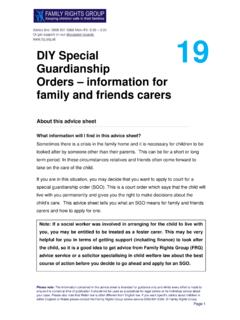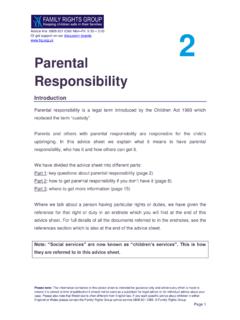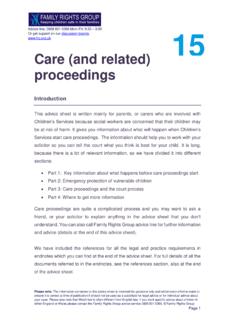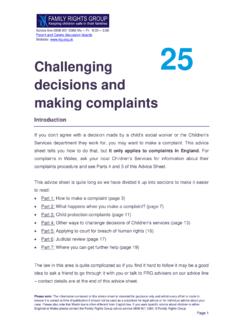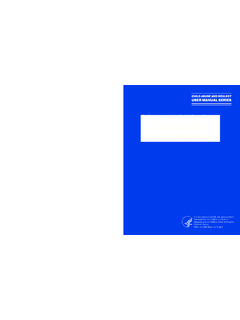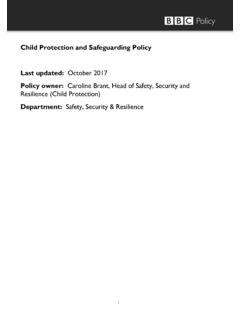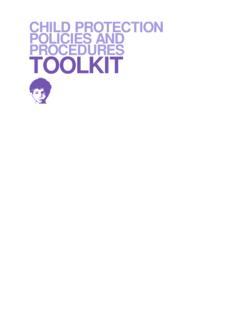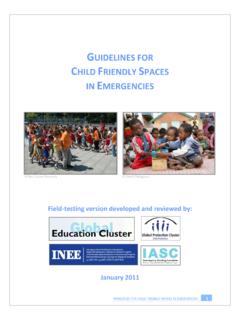Transcription of Child Protection Procedures - Family Rights Group
1 Advice line: 0808 801 0366 Mon Fri: 9:30 3:00. Get support on our discussion boards. View FRG's film for families & practitioners which reconstructs a Child Protection Conference Child Protection 9. Procedures Introduction When Children's Services receive information that makes them suspect a Child may be at risk of harm, they must look into the situation and take any action necessary to make sure the Child is safe and well looked after. This advice sheet outlines the likely steps that Children's Services will take in these circumstances and the legal position of parents and other Family members. This advice sheet is written mainly to answer the questions that parents or others caring for the Child might have. It is divided into four sections to make it easier to read: Part 1: Key questions about Child Protection (page 2). Part 2: What happens in the Child Protection process?
2 (page 7). Part 3: Challenging Child Protection decisions (page 29). Part 4: Where can I get more information? (page 31). Since Child Protection is a complicated process, you may want to ask a friend or your solicitor to explain anything that you don't understand. The references for all the legal and practice requirements are in the notes at the end of the advice sheet. Details of all the documents referred to in the end notes are in the references section on page 36. of the advice sheet. Note: Social Services are now known as Children's Services . This is how they are referred to throughout this advice sheet. Please note: The information contained in this advice sheet is intended for guidance only and whilst every effort is made to ensure it is correct at time of publication it should not be used as a substitute for legal advice or for individual advice about your case.
3 Please also note that Welsh law is often different from English law. If you want specific advice about children in either England or Wales please contact the Family Rights Group advice service 0808 801 0366. Family Rights Group Page 1. PART 1: KEY QUESTIONS ABOUT Child Protection . When will Children's Services make enquiries about my Child 's safety and wellbeing? If Children's Services receive information (called a referral') from a member of the public or another professional (such as a teacher or doctor)1 which makes them suspect that your Child may not be safe and well cared for, they must make enquiries to find out if this is true. These enquiries are called ' Child Protection enquiries' or 'a Child Protection investigation'. The aim is for Children's Services to gather information about your Child 's circumstances and to decide whether they should take any action to keep your Child safe and promote his/her welfare.
4 How will I be involved in any Child Protection enquiries? If Children's Services hear that your Child may be at risk of harm, they must decide within one working day of receiving the referral: what kind of assessment (if any) they should do whether they need to start making Child Protection enquiries You and your Child should be informed about what they plan to If they decide to start Child Protection enquiries, a social worker will assess your Family 's situation and decide whether they think your Child is suffering or is likely to suffer significant harm'. The social worker should carry out any Child Protection enquiry in such a way as to limit the distress for you and your What if they don't understand my culture? Children's Services should consider all children and their parents as individuals. Family structures, culture, religion, ethnic origins and other characteristics should be respected4.
5 This means that the social worker should try to understand how your Family Please note: The information contained in this advice sheet is intended for guidance only and whilst every effort is made to ensure it is correct at time of publication it should not be used as a substitute for legal advice or for individual advice about your case. Please also note that Welsh law is often different from English law. If you want specific advice about children in either England or Wales please contact the Family Rights Group advice service 0808 801 0366. Family Rights Group Page 2. operates and work with your whole Family and any other sources of support you may have in your community. They should also respect any religious beliefs and cultural traditions you have that may influence how your Family operates. They should be aware of the effects of racial harassment and racial discrimination and be careful not to stereotype when doing their assessment.
6 If your Child has links to a foreign country, social workers should discuss with you as early as possible what help the foreign Embassy might be able to provide. Government guidance points out that the Embassy may be able to help the social worker to work more positively with you and explain any differences in approach to Child Protection matters5. Will Children's Services want to see my Child ? Yes. Children's Services will want to see your Child and they will generally ask for your agreement before speaking to him or her. Government guidance says that wherever possible the social worker should see your Child alone and it is the social worker's job to find out what your Child thinks about their situation and any help your Family Can Children's Services speak to my Child without my permission? They can do, if they think that asking your permission would put your Child at further This might arise in joint police and Children's Services' enquiries or in investigations where there is: a concern that a possible victim (for example your Child ) may be threatened into silence.
7 A strong likelihood that important evidence may be destroyed; or your Child does not want you involved and is able to make that decision. But Government guidance is clear that the police and Children's Services need your agreement to interview your Child on What if I don't want Children's Services to see my Child ? Please note: The information contained in this advice sheet is intended for guidance only and whilst every effort is made to ensure it is correct at time of publication it should not be used as a substitute for legal advice or for individual advice about your case. Please also note that Welsh law is often different from English law. If you want specific advice about children in either England or Wales please contact the Family Rights Group advice service 0808 801 0366. Family Rights Group Page 3. If you refuse to allow Children's Services to see or speak to your Child , they may apply to the court for a Child assessment order9 or even an emergency Protection order (EPO) or care order.
8 With any of these orders they could remove your Child from your care against your wishes, although the length of time varies according to the order that is made. It is therefore very important that you allow Children's Services to see your Child to avoid this happening. If you want to discuss this with someone, you can get in touch with Family Rights Group advice line contact details are at the end of the advice sheet. Can Children's Services remove my Child ? Your Child cannot be removed from your care by the Child Protection process itself. But they can be removed from your care if: you (or another person with parental responsibility) agrees the court has made a care order or emergency Protection order giving Children's Services the right to remove your Child the situation is so serious that Children's Services ask the police to remove your Child without a court order they can do this for up to 72 hours Important note: The vast majority of children remain with their families throughout the Child Protection process and afterwards.
9 However, the fact that there are Child Protection enquiries does mean that Children's Services are concerned about your Child 's welfare and/or safety. If they continue to be concerned, they can apply to court for an order saying that they can remove your Child from your care. However, if they plan to do this, they should normally tell you this by letter and give you a final chance to make sure your Child is safe before they apply to court. If there is an emergency, these steps may not apply. For more information on this see page 24. For further information about the steps Children's Services could take to remove your Child from your care see FRG advice sheet Care (and related) proceedings: Please note: The information contained in this advice sheet is intended for guidance only and whilst every effort is made to ensure it is correct at time of publication it should not be used as a substitute for legal advice or for individual advice about your case.
10 Please also note that Welsh law is often different from English law. If you want specific advice about children in either England or Wales please contact the Family Rights Group advice service 0808 801 0366. Family Rights Group Page 4. If you are in any of these situations it is really important that you seek independent legal advice immediately. You can contact the FRG advice service or a solicitor contact details at the end of this advice sheet. How can I help my Child and my Family ? You probably won't end up in court, but you may well need independent specialist legal advice about your situation, and/or to have some support in meetings. You should contact Family Rights Group or a children's law solicitor as soon as Child Protection enquiries start - contact details are at the end of this advice sheet. Whether you have a solicitor or not, it is worth arranging for an advocate or supporter to come with you to any meetings for moral support, to help you put your points across and to make notes for you.

